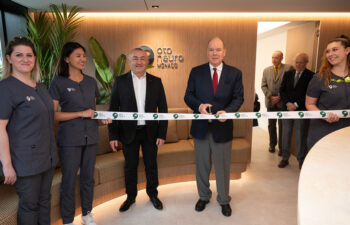Three lessons from Neuromod’s Chief Scientific Officer, Professor Hubert Lim’s interview with Dr Ben Thompson

Treating tinnitus with bimodal neuromodulation is an area that attracts a lot of attention amongst those in the tinnitus research and healthcare communities, as well as amongst people who live with tinnitus.
Bimodal neuromodulation is the underlying approach that allows the Lenire device to soothe the effects of tinnitus. Even though Lenire is an easy-to-use device, the scientific background and mechanisms of action for bimodal neuromodulation can be difficult to understand.
In this conversation, Neuromod’s Chief Scientific Officer, Prof. Hubert Lim speaks to Dr. Ben Thompson of Treble Health about this promising research field, explaining how multiple groups have independently investigated and shown the ability of bimodal neuromodulation to treat tinnitus.
Also discussed in this insightful interview is Hubert’s early career, current research being carried out in the area of tinnitus, and the large-scale clinical trials conducted by Neuromod Devices that demonstrated the effectiveness of the Lenire device.
This conversation provides additional information about tinnitus research but here are three key takeaways from the interview, which we’d recommend you watch in full below.
1. Prof. Lim came up with ideas of how to apply bimodal stimulation to treating tinnitus by accident!
During his PhD in the University of Michigan and then his postdoc in Germany, Prof. Lim was working on various ways to stimulate the auditory pathway in animals and human for restoring hearing for those suffering from deafness. This research led to a clinical study where deaf patients were provided a stimulation implant into the brain for restoring hearing. In these patients, Prof. Lim discovered unexpectedly that you could stimulate different non-auditory pathways, such as those in the somatosensory system (which is part of the nervous system that is associated with the sense of touch from different body regions), to alter coding in the brain that could suppress tinnitus perception.
When starting his faculty position at the University of Minnesota, he came up with several ideas to stimulate at least two neural pathways, which included the somatosensory system, to drive changes in the brain to treat tinnitus. Prof. Lim performed multiple studies in animals demonstrating that bimodal neuromodulation involving sound presented to the ears and electrical stimulation applied to different body regions achieved long-lasting changes in the brain relevant for tinnitus treatment. One major driver of changes in the brain involved electrical stimulation of the tongue combined with sound stimulation.
2. Many participants in Neuromod’s clinical trials experienced an improvement in their tinnitus symptoms after just six weeks of treatment with bimodal neuromodulation
In the interview, Prof. Lim revealed that many participants in the Lenire clinical trials experienced improvements in their bothersome tinnitus as early as six weeks into the treatment when the first evaluation was performed on the participants during their treatment regimen. These benefits were measured using a standard method in the tinnitus field, known as the Tinnitus Handicap Inventory (THI).
3. When it comes to clinical study design, there are key differences between pharma trials and medical device trials.
Prof. Lim explains some differences between study designs between trials for medical devices and new drugs. People are generally more familiar with pharmaceutical clinical trials where a drug is being trialled on people, such as a pill or a vaccine. In these clinical trials there is a placebo control group, the participants of which unknowingly receive a sugar pill or fluid solution in a vaccine, not containing the drug in question. Those who receive the sugar pill or non-vaccine fluid solution would generally not know they are in the control group; this is known as blinding.
The results from the control group can be monitored and compared with those receiving the actual drug to ascertain the impact of the treatment benefits relative to the placebo effects. This type of placebo-controlled approach becomes more challenging or even impossible when it comes to medical device studies, especially for non-implanted devices where the participants see the device and are aware when the treatment is being provided to them.
When performing a clinical trial using a bimodal neuromodulation device such as Lenire, which uses electrical stimulation to the tongue and sound stimulation to the ear that is perceptible to participants and the subjects know they should be feeling or hearing the stimuli, it’s more difficult to have a placebo-controlled group. If the group has no electrical stimulation to the tongue or no sound presented to their ears, they will become aware that they are in the control group; and hence, become unblinded, which introduces biases or confounding factors into the study.
Therefore, one well established or accepted approach for clinical trials that can address those challenges is to design the study with different dosages given to different groups. This is known as an active dose comparator control and allows researchers to investigate which dose or stimulation pattern is more effective while still maintaining blinding since participants are getting actual treatment but they are not able to know which dosage they received. In Lenire’s trials, different stimulation patterns or dosages were given to different groups that maintained blinding in the studies.
Watch the full video of the interview to learn more about the field of bimodal neuromodulation for treating tinnitus, clinical trial design considerations, and other tinnitus research topics.



